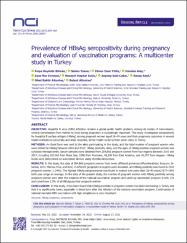| dc.contributor.author | Bilman, Fulya Bayındır | |
| dc.contributor.author | Tosun, Selma | |
| dc.contributor.author | Yıldız, İlknur Esen | |
| dc.contributor.author | Alay, Handan | |
| dc.contributor.author | Evrenos, Ayşe Nur | |
| dc.contributor.author | Kutlu, Hüseyin Haydar | |
| dc.contributor.author | Çakar, Zeynep Şule | |
| dc.contributor.author | Kesli, Recep | |
| dc.contributor.author | Altuntaş, Sibel Baktır | |
| dc.contributor.author | Altuntaş, Bülent | |
| dc.date.accessioned | 2022-09-13T05:33:28Z | |
| dc.date.available | 2022-09-13T05:33:28Z | |
| dc.date.issued | 2021 | en_US |
| dc.identifier.citation | Bilman, F. B., Tosun, S., Yildiz, I. E., Alay, H., Evrenos, A. N., Kutlu, H. H., Cakar, Z. S., Kesli, R., Altuntas, S. B., & Altuntas, B. (2021). Prevalence of HBsAg seropositivity during pregnancy and evaluation of vaccination programs: A multicenter study in Turkey. Northern clinics of Istanbul, 8(4), 359–364. https://doi.org/10.14744/nci.2020.26504 | en_US |
| dc.identifier.issn | 2148-4902 | |
| dc.identifier.uri | https://doi.org/10.14744/nci.2020.26504 | |
| dc.identifier.uri | https://hdl.handle.net/11436/6445 | |
| dc.description.abstract | OBJECTIVE: Hepatitis B virus (HBV) infection remains a global public health problem. Among its modes of transmission, vertical transmission from mother to child during pregnancy is exceedingly important. This study investigated seropositivity for hepatitis B surface antigen (HBsAg) among pregnant women aged 16-49 years and their pregnancy outcomes in several health institutions (university and state hospitals, family health centers) from seven cities in Turkey.
METHODS: An Excel form was sent to the sites participating in the study, and the total number of pregnant women who were tested for HBsAg between 2010 and 2017, HBsAg positivity rates, and the ages of HBsAg-positive pregnant women was collected retrospectively. Serum samples were obtained from 204,865 pregnant women from four regions between 2010 and 2017, including 107,463 from Black Sea, 2306 from Marmara, 48,339 from East Anatolia, and 46,757 from Aegean. HBsAg levels were determined on automated devices using chemiluminescence.
RESULTS: In the study, the data of 204,865 pregnant women from seven different provinces (Afyonkarahisar, Erzurum, Istanbul, Izmir, Manisa, Mus, and Rize) in different geographical regions were accessed, and HBsAg positivity was found in 2343 pregnant women (1.14%). The highest HBsAg seroprevalence was found in women who were older 26-40 years/1977-1991 birth year range on average. In the data of the present study, the number of pregnant women with HBsAg positivity among pregnant women born after the initiation of the national vaccination program and catch-up vaccination program is only 124 and constitutes 5.3% of all HBsAg-positive pregnant women
CONCLUSION: In this study, it has been found that HBsAg positivity in pregnant women has been decreasing in Turkey and that it is significantly lower, especially in those born after the initiation of the national vaccination program. Continuation of national neonatal HBV vaccination with high compliance is very important. | en_US |
| dc.language.iso | eng | en_US |
| dc.publisher | Kare Publishing | en_US |
| dc.rights | info:eu-repo/semantics/openAccess | en_US |
| dc.subject | HBsAg | en_US |
| dc.subject | Pregnancy | en_US |
| dc.subject | Seropositivity | en_US |
| dc.title | Prevalence of HBsAg seropositivity during pregnancy and evaluation of vaccination programs: A multicenter study in Turkey | en_US |
| dc.type | article | en_US |
| dc.contributor.department | RTEÜ, Tıp Fakültesi, Dahili Tıp Bilimleri Bölümü | en_US |
| dc.contributor.institutionauthor | Yıldız, İlknur Esen | |
| dc.identifier.doi | 10.14744/nci.2020.26504 | en_US |
| dc.identifier.volume | 8 | en_US |
| dc.identifier.issue | 4 | en_US |
| dc.identifier.startpage | 359 | en_US |
| dc.identifier.endpage | 364 | en_US |
| dc.relation.journal | Northern Clinics of Istanbul | en_US |
| dc.relation.publicationcategory | Makale - Uluslararası Hakemli Dergi - Kurum Öğretim Elemanı | en_US |


















